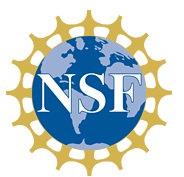
Collaborative Research: A Unifying Deep Learning Framework Using Cell Complex Neural Networks
NSF SCALE MoDL grant on Mathematical and Scientific Foundations of Deep Learning
PIs : Mustafa Hajij and Nina Miolane.
Collaborators : Tolga Birdal
Deep learning has fostered the development of many new technologies, ranging from automatic medical image analysis to document translation powered by artificial intelligence. These societal transformations originated with rapid advancements in the fields of computer vision and natural language processing, that is, the processing of images and texts. Yet, a wide range of data is not best represented by a grid of pixels or a sequence of words. For example, (biomolecular) shapes or (social) networks are data types exhibiting local and global geometric properties that might not be efficiently leveraged by existing deep learning architectures. Hence, there is a need to rigorously understand and expand the data types to which deep learning methods can be applied. This research project considers the more abstract "cell complex" data type. The work introduces and aims to quantify the potential of "cell complex networks" in deep learning. Applications range from computational biology and medicine, social science, and art, to a better understanding of deep learning itself. The project will disseminate these ideas through publications and the release of open-source software, demonstration material, and datasets. The results are expected to enhance existing ties between deep learning and other fields that rely on geometric, topological, and combinatorial objects. The needs of diverse machine learning communities will be addressed by carefully choosing publication venues. Research training will be provided to undergraduate and graduate students, where the recruiting process will encourage applications from underrepresented groups. Pair-programming sessions, together with occasional hackathons, will help train the next generation of practitioners in topological and geometric deep learning, complementing their theoretical training with pivotal software engineering practices. This project will also facilitate outreach through public lectures featuring speakers from diverse backgrounds.
This research aims to develop a unifying mathematical framework where deep learning models and protocols can be universally defined and executed over cell complex domains. Such domains generalize discrete domains of practical importance such as graphs, point clouds, meshes, and simplicial complexes. The project first unifies existing deep learning computational blocks into the framework of cell complex neural networks (CXNs). The investigators plan to rigorously construct the necessary tools of neural network computational primitives over domains that have geometric, topological, and combinatorial characteristics. They will investigate important theoretical questions associated to these models, such as generalizability and expressiveness in the light of metrics specifically defined for CXNs. Second, the project will harness the power of deep learning in answering questions that arise when studying data with such topological and combinatorial structures. The project will provide benchmarks for graph, point cloud, and mesh data types, leveraging both simulated and real datasets. The investigators will develop an open-source Python package that gathers the topological and combinatorial deep learning primitives with an interface allowing study of their theoretical properties. Third, the project will apply these tools to the understanding of deep learning itself. The work will leverage CXNs to extract geometric and topological summaries of the sequence of weight iterates generated during the training of a given network. The investigators will connect these summaries to the generalizability of the deep learning algorithm and architecture at hand.